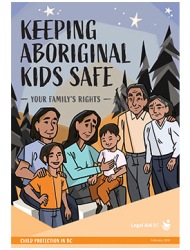If you can't take care of your children for a while, you can ask the Ministry of Children and Family Development (or a delegated Aboriginal agency) to place them with family or friends to care for them. This means instead of going into foster care, your children stay with someone they know.
You can arrange for this through an Extended Family Program agreement. This is sometimes called an EFP agreement. The EFP agreement is for only a limited time.
Parent Support Services Society of BC — Gives support to parents and caregivers, and has a support line for grandparents raising grandchildren — Call 1-855-474-9777
Extended Family Program — Ministry website includes information about the steps involved to become a caregiver
Parents Legal Centre — Provides a free lawyer and an advocate to help parents in select locations address the social worker's concerns about their children's safety (child protection) early on

